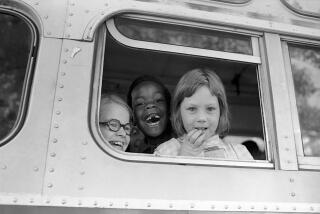Despite Choice, Few Switch Schools, Study Shows
WASHINGTON — School choice, the cornerstone of President Bush’s education reform plan, has been embraced by less than 2% of parents in the 13 states in which it is now available, a study released today said.
The study by the Carnegie Foundation for the Advancement of Teaching found that 70% of parents with children in public schools across the nation said they would not want to send their child to a different school.
Bush repeatedly has said that giving parents vouchers that would allow them to select from among public and private schools would improve all schools. Democratic nominee Bill Clinton supports allowing parents to choose among public schools but opposes government financing of private or religious schools. Unlike Bush, Clinton does not see “choice” as the key engine driving school reform.
Ernest L. Boyer, president of the Carnegie Foundation and the former U.S. commissioner of education, called school choice “a diversion to present choice as a panacea--some grand design that can miraculously sweep away all the difficulties that impede schools and restrict learning.”
The study also found that statewide choice programs tend to widen the gap between rich and poor districts, are expensive and that, at best, their effect on education is ambiguous. None of the 13 states with some type of school choice program have demonstrated significant gains that can be attributed to the new option.
Some of the Carnegie survey results are in contrast to other recent polls that have showed a majority of Americans favor a voucher system. Several pollsters say the phrasing of the survey questions on this topic can lead to wildly varying results.
Education Secretary Lamar Alexander, an advocate of choice, issued a written response to the new survey, saying its finding that 28% of parents would like to send their child to some other public or private school was “astonishing.”
More to Read
Sign up for Essential California
The most important California stories and recommendations in your inbox every morning.
You may occasionally receive promotional content from the Los Angeles Times.










